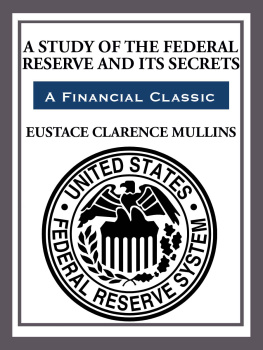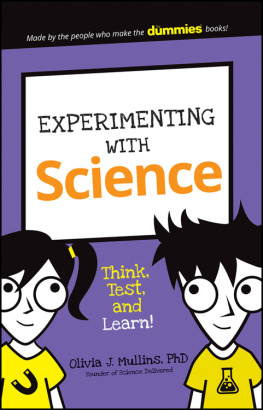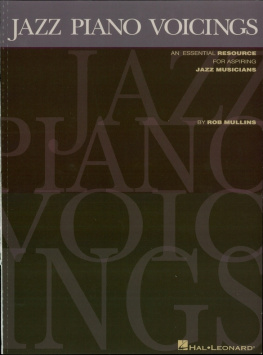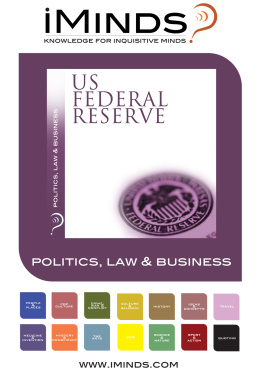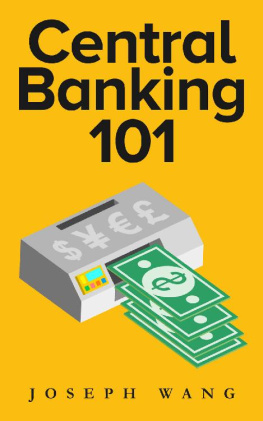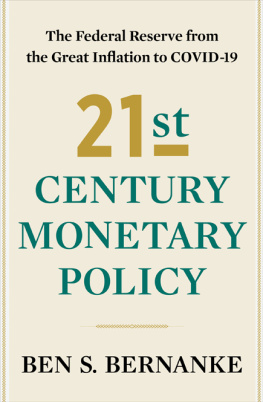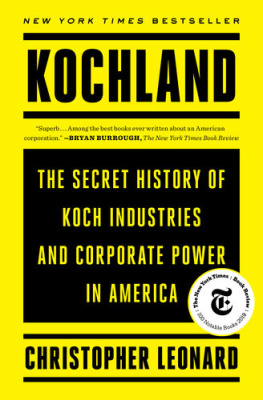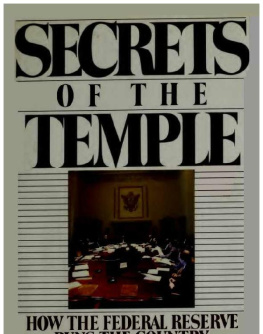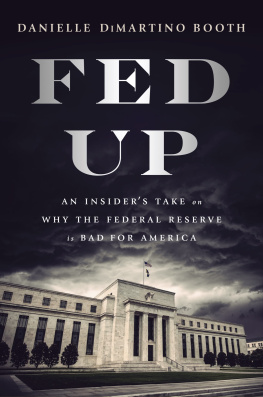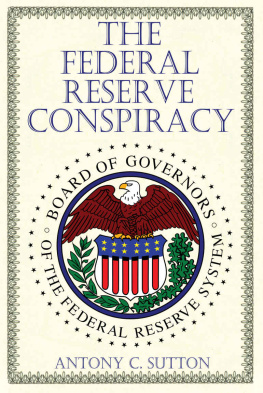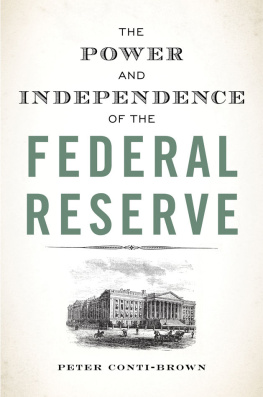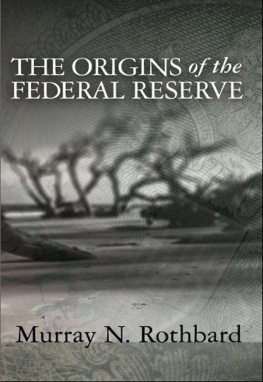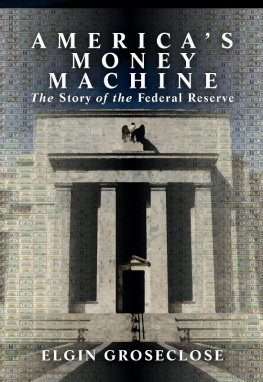Start Publishing LLC
Copyright 2012 by Start Publishing LLC
All rights reserved, including the right to reproduce this book or portions thereof in any form whatsoever.
First Start Publishing eBook edition October 2012
Start Publishing is a registered trademark of Start Publishing LLC
Manufactured in the United States of America
10 9 8 7 6 5 4 3 2 1
ISBN 978-1-62793-114-4
Preface
In the fall of 1949 I went to the Library of Congress to get material for a newspaper article about the Federal Reserve Board of Governors. What I expected to be a weeks labor turned into a lengthy research job of nineteen months, for I discovered, in my initial inquiry, that there existed not one narrative account of the origins and activities of this powerful organization. Consequently, the majority of my information was gathered piecemeal from a vast number of periodicals, ranging from popular magazines such as the Saturday Evening Post to the exclusive bankers magazine, The Economist.
The standard works on the Federal Reserve System, almost entirely abstruse and technical works on economics, I found of little practical value. Even in the matter of acceptances, the usual textbooks contained no information upon such an important item in Americas economic history as the changeover from the open-book system of credit to the acceptance system, which has wrought such vast changes in our practice of commerce, and for this information I found only one source, a few pamphlets published by the American Acceptance Council from 1915 to 1928. It is, then, little wonder that the student with a Masters Degree in Economics from one of the better universities will see here for the first time material which should have been before him in his elementary courses.
The birthplace of the Federal Reserve Act, Jekyl Island, is now operated as a public park by the State of Georgia, but the tourist will find no plaque there commemorating the event. This is not so much an oversight on the part of the park officials as it is a triumph for the more than adequate publicists of the Federal Reserve Board, who have perpetuated the comfortable fiction that the Act was born in the halls of Congress, the product of the minds of Carter Glass and Woodrow Wilson. It is the writers hope that this and many similar fictions will not long survive the publication of this work.
E. MULLINS,
Jan. 12, 1952
A STUDY OF THE
FEDERAL RESERVE AND ITS SECRETS
By
EUSTACE CLARENCE MULLINS
Bibliography of "The Federal Reserve"
Poors Directory of Directors, Standard and Poor Publishing Corp. Volumes referred to from 1928 to 1951.
Whos Who In America, A. N. Marquis Co. Volumes referred to from 1896 to 1951.
The Federal Reserve System, by Paul Moritz Warburg, MacMillan, 1930. The Federal Reserve System, by H. Parker Willis, Ronald Co., 1923.
A B C of the Federal Reserve System, by E. W. Kemmerer, Princeton University Press, 1919.
Adventure In Constructive Finance, by Carter Glass, Doubleday, 1927.
U. S. Federal Reserve Board Bulletins. Volumes referred to from 1914 to 1951.
U. S. Federal Reserve Board Annual Reports. Volumes referred to from 1914 to 1950.
Banking Reform in the United States, by Paul Moritz Warburg, Academy of Political Science, Columbia University, July, 1914.
Senate Committee Hearings on Federal Reserve Act, 1913.
House Committee Hearings on Federal Reserve Act, 1913.
House Committee Hearings on the Money Trust (Pujo Committee) 1913.
Congressional Record, 1913.
House Investigation of Federal Reserve System, 1927-1928.
Senate Investigation on Fitness of Eugene Meyer to be a Governor of the Federal Reserve Board, 1930.
Senate Hearings on Office of Price Administration, 1941.
House Report on Nomination of Thomas D. Jones to be a Governor of the Federal Reserve Board, 1914.
Senate Hearings on Office of Price Administration, 1944.
Senate Hearings on Thomas B. McCabe to be a Governor of the Federal Reserve System, 1948.
House Committee Hearings on Extension of Public Debt, 1945.
Chapter Three
SAMUEL UNTERMYER
The speeches and writings of Senator LaFollette and Congressman Lindbergh had become rallying points for opposition to the Aldrich Plan in 1912. They had also aroused popular feeling against the power of the Money Trust, so that Congress was forced to consider taking action. Congressman Lindbergh said:
The government prosecutes other trusts, but supports the money trust. I have been waiting patiently for several years for an opportunity to expose the false money standard, and to show that the greatest of all favoritism is that extended by the government to the money trust.
Senator LaFollette made a speech charging that a money trust of fifty men controlled the nation. George F. Baker, partner of J. P. Morgan, on being queried by reporters as to the truth of this sensational accusation, replied that it was absolutely in error. He said that he knew personally that not more than eight men ran this country.
Nation magazine replied editorially to Senator LaFollette that:
If there is a Money Trust, it will not be practical to establish that it exercises its influence either for good or for bad.
The editors of the Nation apparently had never heard of the Panic of 1907. However, it certainly was not practical to establish the power of the Money Trust. Senator LaFollette remarks in his Memoirs that that speech cost him the Presidency of the United States, just as Woodrow Wilsons speech in favor of the Aldrich Plan had brought him at once to consideration for that office.
Despite the Nations high-minded detachment, there did seem to be plenty of evidence that the Money Trust exercised its influence for bad. Not only was it despoiling the natural resources of the United States at a rapid rate, but it was not above the most ruthless application of gangster tactics in politics. There were more than reasonable grounds for suspecting that the National City Bank had blown up the Maine to precipitate the Spanish-American War and win the sugar industry of Cuba. Kuhn, Loebs sponsorship of Rockefeller had brought hardship and ruin to thousands of small oil producers all over the country, while instances of the destructive influence of Morgan and other New York bankers could be cited for many pages.
Congress finally made a gesture of appeasing popular feeling by appointing a committee to investigate the control of money and credit in the United States. This was the Pujo Committee, which conducted the famous Money Trust hearings in 1912, under the leadership of Congressman Arsene Pujo of Louisiana. Pujo had been sent to Congress by the oil interests of his state.
The testimony given at these hearings, which dragged on for five months, made four volumes of some six thousand pages. The bankers, month after month, made the train trip down to Washington from New York, testified before the Committee, and returned to New York. The hearings were extremely dull, and those who had expected that much startling information would be turned up at these examinations were disappointed. The bankers solemnly agreed that they were bankers, insisted they operated in the publics interest, and claimed that they were animated by the highest ideals of public service, like the Congressmen. Insofar as the hearings were concerned, this seemed to be true. The bankers were asked few questions which were embarrassing, and nothing was brought out which the public might have been excited by. The newspapers played up the hearings, carrying headlines each day about the Money Trust, but the paragraphs below the headlines had little in them that was interesting.
The nature of the hearings may be better understood if we look at the man who single-handedly carried on the entire investigation, Samuel Untermyer. He was also one of the main contributors to Woodrow Wilsons campaign fund. Untermyer was one of the wealthiest corporation lawyers in New York. He states in his autobiography in Whos Who in American Jewry of 1926, that he once received a $775,000 fee for a single legal transaction, the carrying through of the merger of the Utah Copper Company and the Boston Consolidated and Nevada Company, a firm which had at that time a market value of more than a hundred million dollars. A man who could make nearly a million dollars in one operation would not be likely to sincerely attack the wealthy men of his own class.

